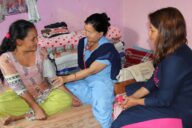 When the first mission workers arrived in Nepal in 1954, Leprosy was endemic and caused much suffering with high levels of disability, social stigma and ostracism from the community. With its mission to serve the poorest and most marginalised, International Nepal Fellowship (INF) opened Green Pastures Leprosy Hospital in 1957. Whilst Leprosy remains an important healthcare and social challenge in Nepal, thankfully the numbers contracting the disease have greatly reduced.
When the first mission workers arrived in Nepal in 1954, Leprosy was endemic and caused much suffering with high levels of disability, social stigma and ostracism from the community. With its mission to serve the poorest and most marginalised, International Nepal Fellowship (INF) opened Green Pastures Leprosy Hospital in 1957. Whilst Leprosy remains an important healthcare and social challenge in Nepal, thankfully the numbers contracting the disease have greatly reduced.
In general, population health has improved with life expectancy rising from 45 to 70 years over the last 40 years, largely through better maternal and child health and a reduction in death from infectious diseases. However, as in other low- and middle-income countries, increased longevity and lifestyle changes are leading to an increase in non-communicable diseases (NCDs). More than 60 per cent of deaths are from NCDs with increasing numbers of people living with disability from long term conditions. According to our modelling, at any one time around 120,000 people in Nepal require palliative care.
This demographic shift in illness requires a fundamental change in the focus of healthcare from acute illness to integrated chronic disease management (CDM) – a particular challenge in such a low-income setting. In a recent survey of advanced chronic illness in rural areas, we estimated that around four per cent of the population are housebound with chronic illness, disability or age-related frailty. Despite government health posts in each village area, the majority of people in this group do not receive effective healthcare. They have difficulty getting to health posts due to rugged terrain and staff who provide care there lack training in CDM. Such people become invisible and marginalised. Families struggle to care for them and according to OXFAM, girls frequently drop out of school to become carers.
Addressing these issues requires a holistic and community development type approach which will transform primary care and empower communities. Health care workers need to be trained and health care facilities need to develop the systems and resources to deliver appropriate CDM. Families need to be given the support in caring for chronically sick and dying members. At the same time, it is imperative to enable children and young people to continue in school and not drop out because of caring duties. Otherwise, the cycle of poverty will continue.
These challenges resonate strongly with urgent global public health priorities for primary care led universal health coverage (UHC) and the recognition that caring for those with advanced illness and the dying is not possible without community mobilisation – a concept which has been promoted in the WHO Palliative Care Strategy and has been named ‘Compassionate Communities’.
Not only do the challenges resonate with global health, they also resonate with the principles of integral Christian mission. Colleagues in the Emmanuel Hospitals Association of India have demonstrated how community palliative care is transformational in the areas they work with effects beyond the care of the dying. In serving the marginalised with advanced illness in rural areas, palliative care teams embody the love of Christ and see communities transformed.
In addressing these challenges, INF Nepal in partnership with Scottish Christian healthcare charity EMMS International have established a palliative care and chronic illness unit at Green Pastures Hospital and Rehabilitation Centre, which was dedicated in November 2020. The new Centre for Excellence, funded by EMMS International, will focus on clinical care, education and research, developing models of care which will enable integrated CDM for rural Nepal. This represents an expansion of EMMS International and INF Nepal’s palliative care work which has been gathering pace over the last eight years involving: needs assessment research, developing training resources, including translating the Palliative Care Toolkit into Nepali, training numerous health care professionals and also training church members in basic, compassionate caring skills.
EMMS International and INF Nepal’s next major project (‘Sunita’ – a girl’s name meaning ‘Justice’) will develop a model of community primary palliative care and compassionate communities for rural areas. Working with Nepali Christian development organisation HDCS, which runs the government Lamjung District Hospital and local Lamjung District health posts, we aim to develop a robust and appropriate health system for palliative care. We plan to work with community teams to train volunteers in caring, modelled on training church members in basic caring. We will work with school students promoting caring as compassionate action for all to be involved in, not just girls and work with schools to see how children involved in caring can be supported to continue their education.
The Sunita Project has the cross-cutting theme of empowering women and girls – #EveryGirlMatters – which is a key area of UKAid policy. If you would like to be involved in helping us develop this compassionate programme, please visit emms.org/everygirl
Dan Munday is an Adviser in Palliative Care to International Nepal Fellowship and Honorary Senior Clinical Lecturer, Primary Palliative Care Research Group, University of Edinburgh



